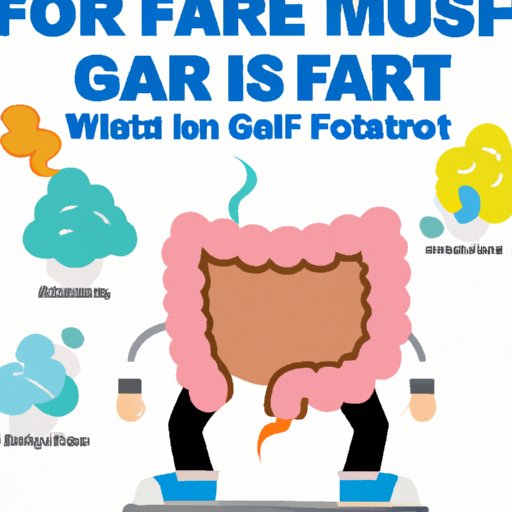Introduction
Farting, or flatulence, is a natural part of the human digestive process. Farts occur when gases that build up in the digestive system are released through the rectum. Although farting can be embarrassing, it’s usually nothing to worry about. Understanding the science behind farting can help reduce any anxiety around this natural bodily function.
A Comprehensive Guide to How Farts Work
Anatomy of a Fart
Farts are made up of several different gases, including nitrogen, oxygen, carbon dioxide, hydrogen, and methane. The exact composition of each fart varies depending on the individual’s diet and the type of bacteria in their gut. When these gases mix together, they create the distinctive smell associated with flatulence.
What Causes Farts and How They Are Produced
Farts are created when food is broken down in the digestive system. As the body digests food, bacteria in the gut break down carbohydrates and other complex molecules into simpler substances like hydrogen and methane. These gases then accumulate in the digestive tract and are eventually released from the body as a fart.
The Mystery of How Farts are Formed
The exact process of how farts are formed is still somewhat of a mystery. According to a study published in Gut Microbes, the type and amount of bacteria in the gut may play a role in determining the composition of a person’s fart. Additionally, different foods have different effects on the production of gas in the digestive system.

Exploring the Science Behind Farting
Definition of Gas in the Digestive System
Gas in the digestive system is produced by bacteria that live in the small intestine. These bacteria feed on carbohydrates and other complex molecules, releasing gases like hydrogen and methane in the process. These gases are then absorbed into the bloodstream and eventually expelled from the body as a fart.
Role of Bacteria and Diet in Fart Formation
The type and amount of bacteria in the gut can affect the composition of a person’s fart. Certain types of bacteria produce more gas than others, and some foods may encourage the growth of certain types of bacteria. For example, a high-fiber diet can increase the amount of gas produced in the gut because fiber is difficult for the body to digest.
Certain foods can also cause an increase in flatulence. Foods high in sulfur, such as broccoli and cauliflower, can cause an unpleasant odor when they are broken down in the digestive system. Additionally, foods high in sugar alcohols, such as sorbitol and mannitol, can cause an increase in gas production.
Effects of Stress and Exercise on Farting
Stress and exercise can also affect the amount of gas produced in the gut. During times of stress, the body releases hormones that can slow down digestion and lead to an increase in flatulence. Similarly, exercise can stimulate the digestive system and lead to an increase in farting.
According to a study published in Medicine & Science in Sports & Exercise, exercise can increase the amount of gas in the intestines, leading to an increase in flatulence. However, the study also found that regular physical activity can help reduce the amount of gas produced in the gut over time.
Conclusion
Farting is a normal part of the human digestive process. Farts are created when food is broken down in the digestive system and gases like hydrogen and methane are produced by bacteria in the gut. The type and amount of bacteria in the gut, as well as the individual’s diet, can affect the composition of a person’s fart. Additionally, stress and exercise can affect the amount of gas produced in the gut.
To reduce the amount of flatulence, try to limit your intake of foods that contain sulfur, sugar alcohols, and fiber. Additionally, regular physical activity can help reduce the amount of gas produced in the gut. If you’re concerned about excessive flatulence, consult your doctor for further advice.
(Note: Is this article not meeting your expectations? Do you have knowledge or insights to share? Unlock new opportunities and expand your reach by joining our authors team. Click Registration to join us and share your expertise with our readers.)
